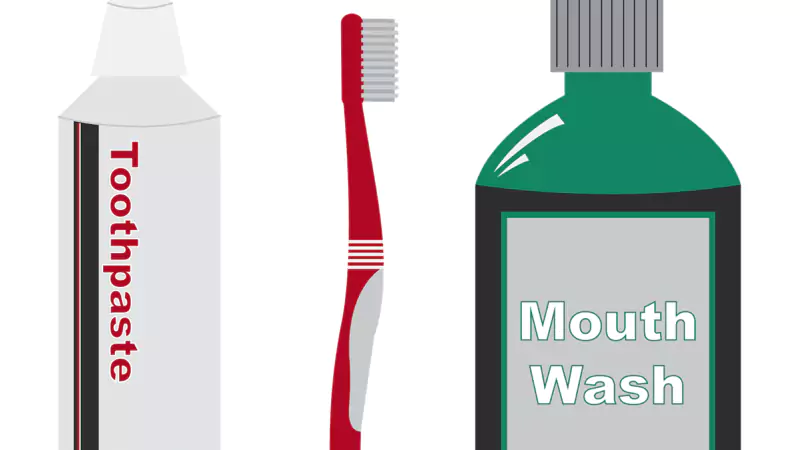Best Mouthwash for Bad Breath
When choosing the best mouthwash for bad breath, we first need to examine the basic ingredients it contains. Because some of these substances are not effective against bad breath and may even increase bad breath. It is useful to know some of the properties of these chemical substances contained in mouthwash against bad breath. In this respect, it would be useful to collect and analyze them under a few main headings. Thus, the possible basic ingredients of mouthwash for bad breath are as follows.
Antiseptic Agents
Antiseptic mouthwashes for bad breath contain germicidal chemicals especially, such as chlorhexidine and cetylpyridinium chloride. We do not need such germicidal chemicals in mouthwash against bad breath. Because although they kill germs in the mouth in a short time and reduce bad breath, they are not suitable for long-term use. Therefore, we should use the mouthwash containing germicidal for a maximum of one week and stop using it after a week.
When mouthwash containing germicides is used for more than a week, they impair taste, cause brown spots on the teeth, cause irritations on the cheek-lip inner mucosa and tongue, and cause various problems by negatively changing the flora balance in the mouth. In other words, although mouthwashes kill germs, they do not permanently remove bad breath. Killing germs is not a permanent solution to bad breath. Accordingly, we cannot cure bad breath by killing the germs in the mouth. In this respect, it will be much safer for oral health and oral hygiene if consumers prefer mouthwash such as ADA approved: TheraBreath Fresh Breath Icy Mint, TheraBreath Fresh Breath Rainforest Mint, etc.) that do not contain the two substances we have mentioned above.
Best Mouthwash for Bad Breath: Containing Zinc Compounds
If the mouthwash does not contain zinc, it will be of little use to use it against bad breath. Zinc salts (zinc gluconate, zinc lactate, zinc chloride) in mouthwash containing zinc bind and precipitate odorous gases in the mouth. Thus, odorous gases cannot fly and bad breath disappears. The most effective substance among these is zinc chloride. Therefore, mouthwash containing zinc compounds (eg, Tom’s of Maine Wicked Fresh Mouthwash, TheraBreath Plus Fresh Breath, etc.) are the most suitable products to eliminate the odor of gum.
Herbal Ingredients
These are substances of plant origin, such as menthol, thymol, eucalyptol, and eugenol. These substances do not remove bad breath, they simply mask it with their odor. This is not to eliminate bad breath, and it is not at all to radically dissolve the smell. Plant-based deodorizers mask bad breath for a while. But the smell is still there. Therefore, they are not an effective solution against bad breath.
The goal of mouthwash should be to eliminate bad breath, not mask it. There is also the possibility that herbal substances may serve as fuel for the bacterial flora in the mouth. Therefore, they can also cause an increase in the bacteria in the mouth in the long term.
Herbal substances can be effective against bad breath. But it is necessary to choose the right usage areas. For example, it would not be appropriate to resort to herbal solutions, while brushing the tongue, and teeth and using mouthwash containing zinc to eliminate oral odors. They may be more accurate if we use herbal products for odors originating from the digestive tract. Apart from that, herbal products are more effective for odors (cigarette, garlic, onion, etc.) that we already know the cause of and will pass. In all these respects, ADA approved; CloSYS Sensitive Gentle Mint Mouthwash, TheraBreath Fresh Breath Icy Mint Oral Rinse, etc.) can be a good choice for those who want to eliminate bad breath and additionally feel a fresh odor in the mouth.
Best Mouthwash for Bad Breath: Alcohol-Free
The main threat in mouthwash for bad breath is that it contains alcohol. Many types of mouthwash contain substances such as alcohol and ethanol. Alcohol is a chemical that increases bad breath. Although alcohol has a germicidal effect, it both dries the mouth and increases bad breath by being metabolized in the body with different effects. Therefore, it is a contradiction that alcohol is included in paste, mouthwash, and chewing gum that treat bad breath. As a result, the use of alcohol-free mouthwash (eg, ADA approved; CloSYS Ultra Sensitive Unflavored Mouthwash, TheraBreath Fresh Breath Mild Mint Oral Rinse, etc.) is the absolute and most important criterion to be preferred against bad breath.
References
American Dental Association, MouthHealthy: “Halitosis vs. Bad Breath”
Mayo Clinic: Diseases and Conditions, “Bad Breath”
Oral Health Foundation: “Bad Breath”
PubMed: “Halitosis: a new definition and classification”
ResearchGate: “Instant and freshness effect of mouth rinses on type 1 (oral) halitosis”

